Birds, with their delicate and intricate anatomy, occasionally require surgical interventions to address various health issues. While it may seem surprising that birds undergo surgery, these procedures are often necessary to improve their quality of life and ensure their well-being.
From beak repairs to tumor removals, avian surgeries encompass a wide range of medical interventions. Understanding the reasons behind bird surgeries can shed light on the unique challenges faced by avian veterinarians and the importance of specialized care for our feathered friends.
In this article, we will explore some common reasons why did bird have surgery, the types of procedures performed, and the impact these surgeries can have on the health and longevity of our avian companions.
Join us as we delve into the fascinating world of avian surgery and the remarkable efforts made to ensure the welfare of our feathered companions.
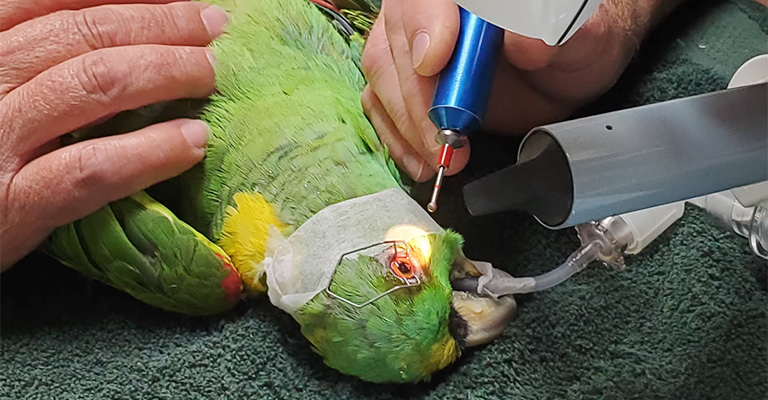
Why Did Bird Have Surgery?
Bird had surgery for various reasons, which can be categorized into medical, cosmetic, and functional purposes. Here are ten detailed reasons why a bird might undergo surgery:
Injury
Birds can sustain injuries from accidents, falls, or attacks by predators. Surgery may be necessary to repair broken bones, damaged tissues, or internal injuries.
Tumor Removal
Birds, like any other animals, can develop tumors. Surgery may be performed to remove benign or malignant growths that could potentially affect the bird’s health and quality of life.
Beak or Nail Trimming
Overgrown beaks or nails can cause discomfort and difficulty in eating or perching. In such cases, a bird may undergo a surgical procedure to trim or reshape the beak or nails, ensuring proper functionality.
Wing Clipping
Wing clipping is a common procedure performed on pet birds to prevent them from flying away or injuring themselves. It involves trimming the primary flight feathers, which limits the bird’s ability to achieve full flight.
Corrective Surgery for Deformities
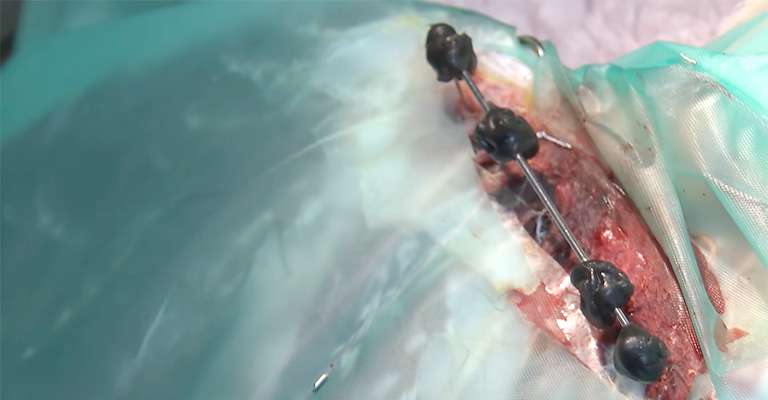
Some birds may be born with congenital deformities, such as splayed legs or crossed beaks. Surgical intervention can help correct these deformities, improving the bird’s mobility and ability to feed properly.
Egg Binding
Female birds occasionally experience complications during egg-laying, leading to egg binding. This condition occurs when an egg becomes stuck in the reproductive tract. Surgery may be necessary to remove the egg and alleviate the bird’s distress.
Gastrointestinal Blockage
Birds are known to ingest foreign objects, which can cause blockages in their digestive system. Surgery may be required to remove the obstruction and prevent further complications, such as infection or organ damage.
Feather Cyst Removal
Feather cysts are abnormal growths that can develop around the feather follicles. These cysts can cause discomfort and restrict feather growth. Surgical removal of the cysts can help restore normal feather development.
Eye Surgery
Birds may require eye surgery to treat conditions such as cataracts, corneal ulcers, or eyelid abnormalities. These procedures aim to improve vision, alleviate pain, and prevent further damage to the eye.
Sterilization
In some cases, bird owners may opt for surgical sterilization, such as spaying or neutering, to prevent unwanted breeding or reduce aggressive behavior associated with hormonal changes.
How a Bird Surgery Is Done?
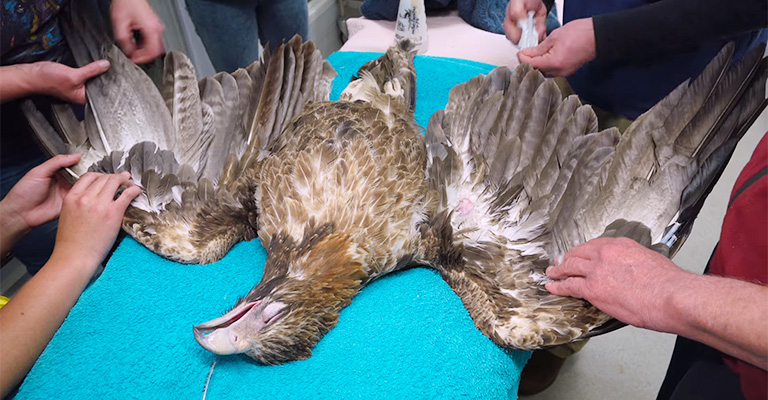
Bird surgery, also known as avian surgery, is a delicate procedure that requires specialized knowledge and skills. Here is a general overview of how bird surgery is typically performed:
Preoperative Assessment
Before the surgery, the avian veterinarian will conduct a thorough examination of the bird to assess its overall health and identify any specific issues that need to be addressed. Diagnostic tests, such as blood work or imaging, may be performed to gather additional information.
Anesthesia
Birds are usually placed under general anesthesia for surgery. The type of anesthesia used will depend on the bird’s species, size, and the specific procedure being performed. Inhalation anesthesia or injectable anesthesia may be administered by the veterinarian.
Monitoring
Throughout the surgery, the bird’s vital signs, including heart rate, respiratory rate, and oxygen levels, are closely monitored. Specialized avian monitoring equipment is used to ensure the bird’s safety and well-being during the procedure.
Sterile Environment
The surgical area is prepared to maintain a sterile environment. This includes wearing sterile gloves, using sterile instruments, and disinfecting the surgical site to minimize the risk of infection.
Incision
Once the bird is properly anesthetized, a small incision is made at the appropriate site. The size and location of the incision will depend on the specific procedure being performed.
Surgical Procedure
The surgeon will perform the necessary surgical steps based on the reason for the surgery. This may involve repairing fractures, removing tumors, correcting deformities, or addressing other specific issues. Specialized instruments designed for avian surgery are used to ensure precision and minimize tissue trauma.
Hemostasis
Hemostasis, or the control of bleeding, is crucial during bird surgery. The surgeon may use techniques such as cauterization, ligatures, or hemostatic agents to achieve hemostasis and prevent excessive bleeding.
Closure
After the surgical procedure is completed, the incision is carefully closed using sutures or surgical staples. The choice of closure method depends on the size and location of the incision, as well as the surgeon’s preference.
Postoperative Care
Once the surgery is finished, the bird is carefully monitored during the recovery period. The avian veterinarian will provide appropriate pain management, antibiotics if necessary, and instructions for postoperative care, including diet, activity restrictions, and wound care.
Follow-up
After the surgery, the bird will typically require follow-up visits to monitor the healing process and ensure that there are no complications. The avian veterinarian will guide the bird’s ongoing care and any necessary rehabilitation.
It is important to note that bird surgery should only be performed by qualified avian veterinarians who have experience and expertise in avian medicine and surgery.
The specific techniques and procedures used may vary depending on the individual bird’s condition and the surgeon’s judgment.
Who Performs Surgery on Birds?
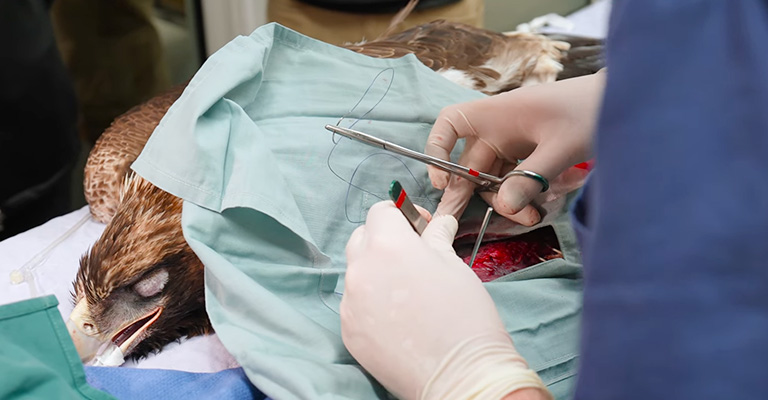
Surgery on birds is typically performed by qualified avian veterinarians who specialize in avian medicine and surgery. These veterinarians have received specialized training and have extensive knowledge and experience in treating birds.
Avian veterinarians undergo additional education and training beyond their veterinary degree to gain expertise in avian medicine.
They learn about the unique anatomy, physiology, and behavior of birds, as well as the specific health issues and diseases that affect them.
Avian veterinarians may work in private veterinary practices that focus on avian medicine or in specialized avian hospitals or clinics. They may also be found in university veterinary teaching hospitals or research institutions.
When performing surgery on birds, avian veterinarians take into consideration the bird’s species, size, age, overall health, and the specific surgical procedure required.
They follow strict protocols to ensure the safety and well-being of the bird during the surgery and throughout the recovery process.
Bird owners must seek the services of a qualified avian veterinarian when their bird requires surgery or any other medical treatment.
Avian veterinarians have the necessary expertise and resources to provide the best possible care for birds and ensure successful surgical outcomes.
How Do I Know If My Bird Needs Surgery?
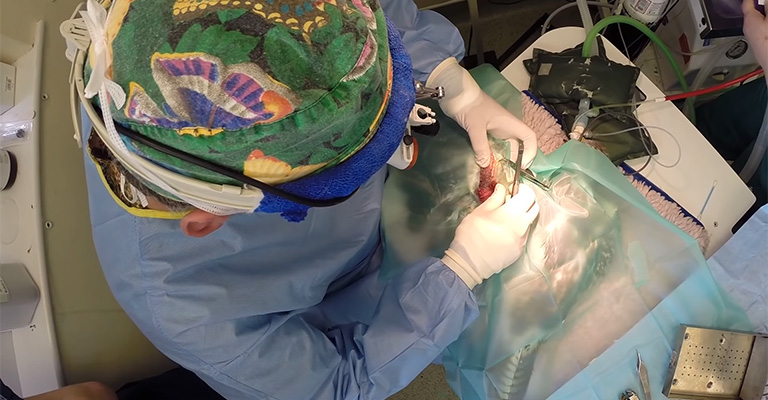
Determining if your bird needs surgery is a decision that should be made by a qualified avian veterinarian. However, there are certain signs and conditions that may indicate the need for surgical intervention. Here are some indications that your bird may require surgery:
Injury
If your bird has suffered a significant injury, such as a broken bone, deep laceration, or internal trauma, surgery may be necessary to repair the damage and promote healing.
Tumors or Abnormal Growths
If you notice any unusual lumps, bumps, or growths on your bird’s body, it is important to have them evaluated by an avian veterinarian.
Surgery may be required to remove tumors or abnormal growths that could be cancerous or affect your bird’s health.
Difficulty Eating or Breathing
If your bird is experiencing difficulty eating, swallowing, or breathing, it could be a sign of an underlying issue that may require surgical intervention.
Conditions such as obstructions, growths, or abnormalities in the respiratory or digestive system may need to be addressed surgically.
Chronic Pain or Discomfort
Birds that exhibit signs of chronic pain, such as lameness, reluctance to move, or changes in behavior, may require surgical evaluation.
Conditions such as joint problems, fractures, or internal issues may be causing the discomfort and may need surgical treatment.
Reproductive Issues
Female birds that are unable to lay eggs or are experiencing complications during the egg-laying process may require surgical intervention.
Egg binding, where an egg becomes stuck in the reproductive tract, can be a life-threatening condition that often requires immediate surgery.
Deformities or Congenital Issues
Birds with deformities, such as splayed legs, crossed beaks, or other congenital abnormalities, may benefit from surgical correction. Surgery can help improve the bird’s mobility, ability to eat, and overall quality of life.
Chronic Infections or Abscesses
If your bird has recurring infections or abscesses that do not respond to conventional treatments, surgery may be necessary to remove infected tissues or address underlying issues.
Eye Problems
Birds with eye conditions such as cataracts, corneal ulcers, or eyelid abnormalities may require surgical intervention to improve vision, alleviate pain, or prevent further damage to the eye.
Gastrointestinal Issues
Birds that have ingested foreign objects or are experiencing gastrointestinal blockages may require surgery to remove the obstruction and prevent further complications.
Sterilization
If you do not intend to breed your bird and want to prevent unwanted breeding behaviors or hormonal issues, surgical sterilization, such as spaying or neutering, may be an option.
FAQs
Surgery in birds carries some inherent risks, as with any surgical procedure. Birds have unique anatomical and physiological characteristics that can make anesthesia and surgery more challenging.
The recovery time for a bird after surgery can vary depending on the type of procedure performed, the bird’s overall health, and the individual bird’s response to surgery. Some birds may recover within a few days, while others may require several weeks.
General anesthesia is commonly used for bird surgeries, but not all procedures require it. Some minor procedures, such as beak or nail trims, may be performed with the bird under sedation or local anesthesia.
The cost of bird surgery can vary depending on factors such as the type of procedure, the complexity of the surgery, the location, and the specific avian veterinarian or clinic. Surgical procedures in birds can range from a few hundred to several thousand dollars.
In some cases, there may be non-surgical alternatives or conservative management options available for certain bird health issues.
However, the suitability of these alternatives depends on the specific condition and the bird’s individual circumstances.
Final Words
Bird surgeries play a crucial role in addressing various health issues and improving the well-being of our avian friends. Whether it’s repairing a beak, removing a tumor, or addressing other medical conditions, these procedures require specialized knowledge and expertise.
Avian veterinarians work tirelessly to provide the best possible care for birds, ensuring their comfort and longevity.
By understanding the reasons behind bird surgeries, we can appreciate the unique challenges faced by these remarkable creatures and the dedicated professionals who care for them.
So, the next time you encounter a bird that has undergone surgery, remember the incredible efforts made to ensure its health and happiness.
Let us continue to support and celebrate the advancements in avian medicine that contribute to the well-being of our feathered companions.